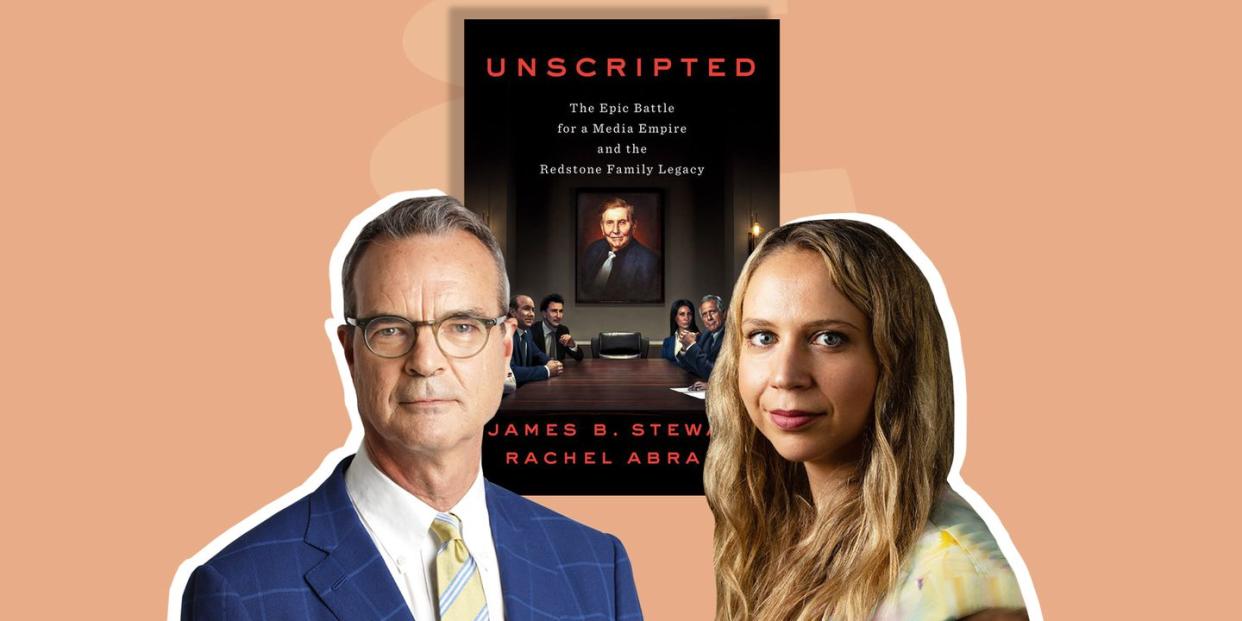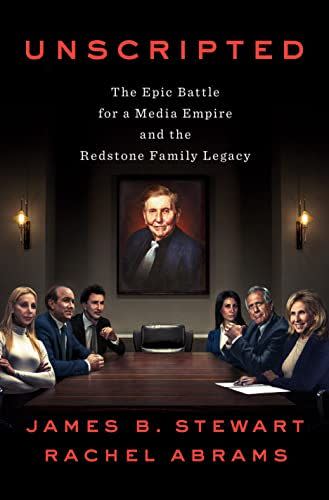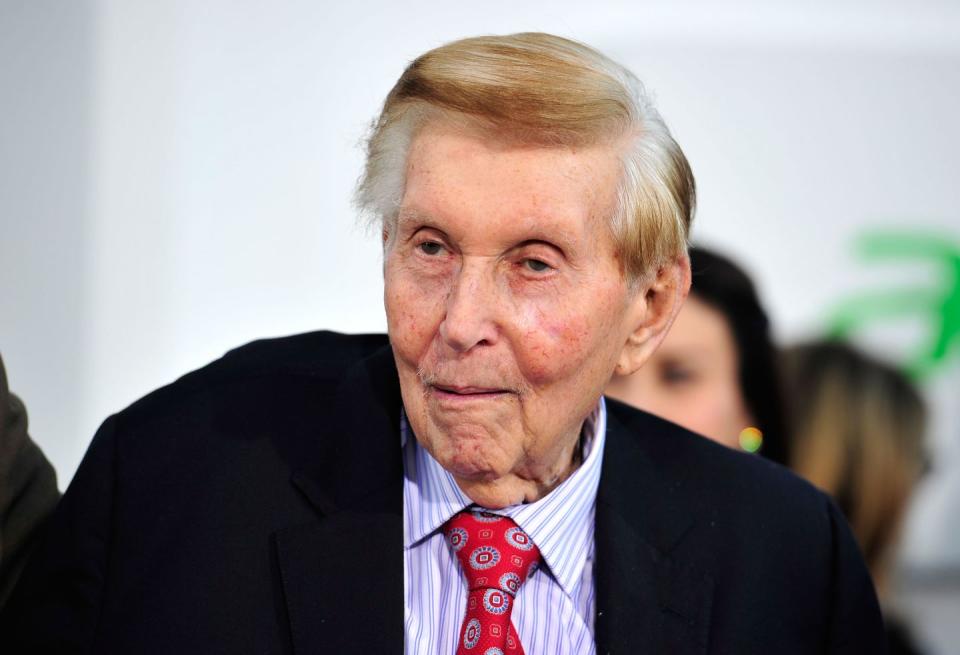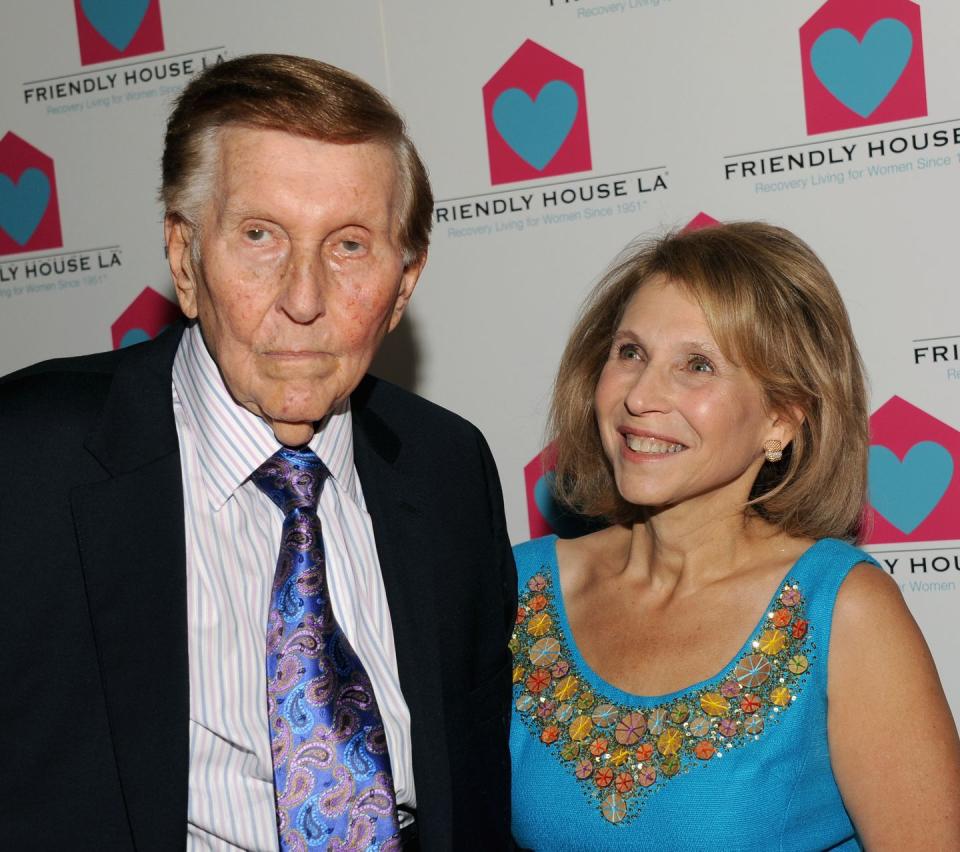The Sordid Family Saga that Makes 'Succession' Look Tame

- Oops!Something went wrong.Please try again later.
- Oops!Something went wrong.Please try again later.
- Oops!Something went wrong.Please try again later.
"Hearst Magazines and Yahoo may earn commission or revenue on some items through these links."
The first rule of media industry scandals is that however ugly it appears from the outside, it's actually much worse on the inside. The second rule is that the full, sordid story will eventually out. Both rules are affirmed by Unscripted: The Epic Battle for a Media Empire and the Redstone Family Legacy, an explosive new page-turner by New York Times reporters James B. Stewart and Rachel Abrams.
The authors are an improbable pair. Stewart is 71; Abrams is 35. He listens to classical music; she loves reality TV. This is his 11th book; this is her first. But their different tastes and skill sets complemented each other perfectly as they broke story after story about CBS CEO Les Moonves and a coverup of sexual misconduct allegations. Now, they’ve expanded on their reporting in Unscripted, which details the deterioration of sex-obsessed media mogul Sumner Redstone and a multi-part battle for control of his companies, CBS and Viacom. Sumner, who had verbally abused his daughter Shari for decades, deeming her unfit to take over the family empire, later became the victim of abuse himself. Two much younger so-called companions, Sydney Holland and Manuela Herzer, moved into his estate and, according to a later lawsuit, manipulated and isolated him. (The women were never charged.) Sumner spent his final years unable to walk, talk, or run his companies. By the time he fully reconciled with Shari and she merged the two companies, creating Paramount Global, the saga seemed ripe for a Succession spin-off.
Because Moonves attempted a corporate coup to wrest control of CBS away from the Redstones at the same time that #MeToo brought his own long-kept secrets to CBS's airwaves, finger-pointing and rumor-mongering pierced every conversation. Reading Stewart and Abrams’ reporting in the New York Times, I remember feeling like we were only reading fragments of the full story. Unscripted fills in the rest. Ahead of the book’s release, I spoke with Stewart and Abrams by phone. (This interview has been edited for length and clarity.)
Esquire: This is not your typical corporate boardroom battle book. For one thing, there is an astonishing amount of sex, not all of it consensual. Rachel, what brought you to this story?
Rachel Abrams: Well, Jim and I got paired up on a New York Times story because we had gotten separate tips about a similar topic, which was the CBS investigation into its own corporate culture. An editor suggested that I ask Jim what he was working on, and I almost didn't, but I happened to be walking by his desk one day. I even had my coat on; I was ready to go, but I stopped at his desk and said, "Jim, I heard you had a tip about the CBS investigation."
James B. Stewart: I don't think I knew who Rachel was. I don't think that we'd ever even had a conversation.
RA: I don't think we ever had.
JS: And you stopped by. A source was feeding me some texts and emails, which were riveting. Rachel's source had access to the same trove, plus way more. That's how we realized that we were on the same track.
ESQ: Jim, this is your 11th book. Is this the raunchiest book you've ever written?
JS: Yeah, by a factor of, I don't even know what number to put on there. 10, 15, 100?
RA: I have been saying that I enjoy reality shows and trashy TV and Page Six, and I'm bringing Jim down to my sensibilities with this book!
JS: Early on, Rachel phrased this as "the #MeToo movement meets the corporate boardroom." And then we eventually realized, "Oh, it's even bigger." It's this whole family drama. And the family drama was driven by two women [Sydney Holland and Manuela Herzer] who inserted themselves into Sumner Redstone's life using, you know, their feminine allure. So sex just permeates the story from beginning to end.

$26.99
amazon.com
ESQ: We can get more specific about the sex: it's about powerful men taking advantage of their status. And that's certainly the case with the patriarch, Sumner.
JS: Absolutely. I mean, Rachel and I have discussed this quite a bit. I mean, I don't think it really is "about" sex. It's more about sex as power. As Rachel has pointed out, it's like the sex was more important to Sumner for impressing his cronies, to show that he was still virile—that he still had, as he liked to say, "the vital statistics of a 20 year old..”
RA: That's totally right. He was constantly bragging, the way that a 15-year-old might brag to his friends, about having sex. And sometimes it wasn't even true, we discovered. He just wanted to seem like he was getting a lot of beautiful women. It's something that might scream "insecurity" if you overheard it at a bar amongst friends. Obviously sex drives a lot of human nature and a lot of behavior. But you would think that there would also be an urge for self-preservation—like, "Hmm, maybe I should keep this out of the office or keep this out of my company." Obviously that wasn't the case here. Sumner mixed sex and work plenty, much to the chagrin of the executives around him, and it really caused a lot of trouble.
JS: I was really struck at how important it was for Sumner to be showing up at these Hollywood red carpet events with a gorgeous young woman on his arm. But, you know, some of the behavior is so bizarre. I mean, he was trying to steal his grandson's girlfriends, and he had the money to do it. It’s just kind of astonishing.

ESQ: One of the other through-lines is abuse. Sumner verbally abused his daughter Shari to anyone who would listen. But then by the end of his life, he was allegedly the victim of elder abuse. How can we possibly understand the relationship between Sumner and Shari?
RA: At its heart, this is a family drama about human themes. It's about sex, of course, but also greed, loneliness, the vulnerability of getting older, and a child's yearning for approval from a withholding parent. A parent who parceled out little dribs and drabs of love, but also could be so cutting, so cruel.
JS: Yeah. You know, Sumner was so horrible to his own family. He drove his son away. I think it's interesting: The son just said, "Okay, I'm done. I'm out of here."
ESQ: He just bought a ranch and lived his own life.
JS: Yeah. He went off. He didn't even show up at the funeral. I mean, that was complete estrangement. But Shari, she kept yearning. I think the final scene of the book is so poignant: her father has just died, and Shari still has to ask his close confidante, "Do you think he really loved me?" After all of that, she still didn't know.
ESQ: Sumner spent his final years in a fog. Jim, I’ve heard you raise this question about the lack of guardrails, and the dearth of people protecting him toward the end of his life.
JA: If he wasn't enormously rich, you wouldn't have had this cast of grifters hanging around him, in my view. You can go back to Dickens, you can go back to Shakespeare—this idea of being able to take advantage of an aging person with money and power is a timeless story, it seems. It doesn't go away. It's embedded in human nature. But in this case, it just shows up magnified by the very, very large sums involved, and by the spotlight of the entertainment world.
RA: Right. If any story exemplifies that money cannot buy you happiness, it's this one.
ESQ: Shari came back into her father's life and eventually took control of the entire media empire. Yet you report in the book that she said to Les Moonves, “I don't want to be a media mogul. I don't want to run this company.” That's remarkable.
JS: That's correct. She was very reluctantly dragged back into all of this, really because of the situation in her father's mansion. She sees that some of the staff and the nurses are so concerned, they start sending emails to Shari reporting what was going on there, and they' were too painful for her to read. She asked her son Tyler to handle that burden. But the fact is, she couldn't let it spiral out of control. I mean, the two women in the house were plotting to gain control of the whole family empire—and came alarmingly close to it.

ESQ: I'm not sure that was clear in the contemporaneous reporting—that there was a real threat of the Redstones losing control of CBS and Viacom.
JS: It's new in the book. We discovered, and we even got the email traffic, showing that they were consulting a high-powered lawyer in New York. You can talk about an "irrevocable trust," but when the creator of the trust is still alive, there are very sophisticated ways of working around these things. The women had a long list on their agenda, including gaining control of the trust, gaining control of the charities, the foundation—not to mention the approximately $150 million that they had already siphoned out of Sumner's accounts.
Nobody knew this at the time. No one had any idea. People were saying, "It's a little weird. He's got these two women living in the house. They hold birthday parties for him." But nobody was really raising serious questions about what was going on there, let alone the fact that Sumner was still the very highly compensated chairman of both CBS and Viacom.
ESQ: CBS was being operated by Les Moonves, who had almost complete autonomy—until those misconduct allegations surfaced. People close to Moonves blamed Shari. It's clear in the book that you investigated those rumors and found no truth to them at all.
RA: Yes. There were so many rumors floating around about how Shari Redstone had somehow "fed" information to Ronan Farrow at The New Yorker—which, by the way, does not give him credit for all the good work he did in bringing the allegations against Les Moonves to light. I even heard at one point that she had paid me! I think we heard every different variation of how she could have been behind this stuff. It would've been such a great story if that was true. But it just was not. There was just no there, there.
JS: Consider the willingness of CBS directors to believe, without a shred of evidence, that Shari was behind all the allegations, and was stirring up all the trouble. And yet, when they got evidence that Les Moonves had engaged in sexual misconduct, they didn't believe that. "Oh, no, no, no, that couldn't be true." They instantly believed the worst about Shari and the best about Moonves.

ESQ: Doesn't some of this stem from a belief that these are the masters of the universe? If this were Succession, or the show I help produce, The Morning Show, then yes, Shari really would have been behind everything against Moonves. But in reality, you say she was totally in the dark.
JS: Well, she heard the rumors about Moonves, and she was the one who brought the rumors to the attention of the board. Do you mean to tell me that no one else on the board had heard any of these rumors? It's sort of incredible.
ESQ: One interpretation is that Shari was incredibly naive about what was happening inside her own family's company.
JS: Maybe—but she thought Moonves was her friend. She went out and had dinner with him and [his wife] Julie Chen, and then Moonves sent her a nice note, saying, This was the nicest dinner we've ever had, Julie loves you,” these kinds of things. And then he turned around and declared nuclear war on her. I think it’s more poignant that she wasn’t scheming when you see the sense of hurt and betrayal that she had to go through. To me, that's highly dramatic and cinematic.
ESQ: Here's another example of this recognition that millionaires and billionaires are perhaps no smarter than the rest of us. Moonves emailed his COO and said Shari, "will come after me big time. I know you have my back!!!" He used three exclamation points. These guys are writing emails and talking like this is high school.
RA: Or The Godfather.
JS: There's another great one too, where the head of independent directors on the CBS board wrote, "That's what friends are for." And I'm thinking, wait a minute, no. You're not supposed to be friends. You are representing the shareholders of this company. And by the way, the biggest shareholders are the Redstone family, yet you’re working hand in glove with the CEO. No, you're not supposed to be friends.
RA: Jim, didn't you have a friend who said to you that after reading our book, no CEO is ever gonna text again?
JS: [Laughs.] Yes, I did. Yes.
ESQ: To the extent that there's a hype machine around CEOs and powerful leaders, these texts just tear it away.
JS: It's like a sharp knife that cuts through all the PR apparatus. You see what they're really thinking and saying in real time.
ESQ: Some of the emails and texts came from lawsuits, but many of them came from sources. Rachel, why were multiple people willing to share these?
RA: Well, I think our confidential source really felt like if this stuff didn't come to light, it would just be stuck in a drawer and hidden away. Nobody would ever talk about it again. It would be like the Fox News outside investigation into its own behavior. Has anyone seen that report? I don't think so. This person just felt like, "if I don't talk to the New York Times, no one's gonna share this."
ESQ: Do you see any reason to believe that the world has really changed, five years since this scandal and six years since #MeToo?
RA: I think that companies have gotten a lot better in handling PR crises. I'm not really sure that companies have gotten a lot better at actually cleaning up their problems.
You Might Also Like

